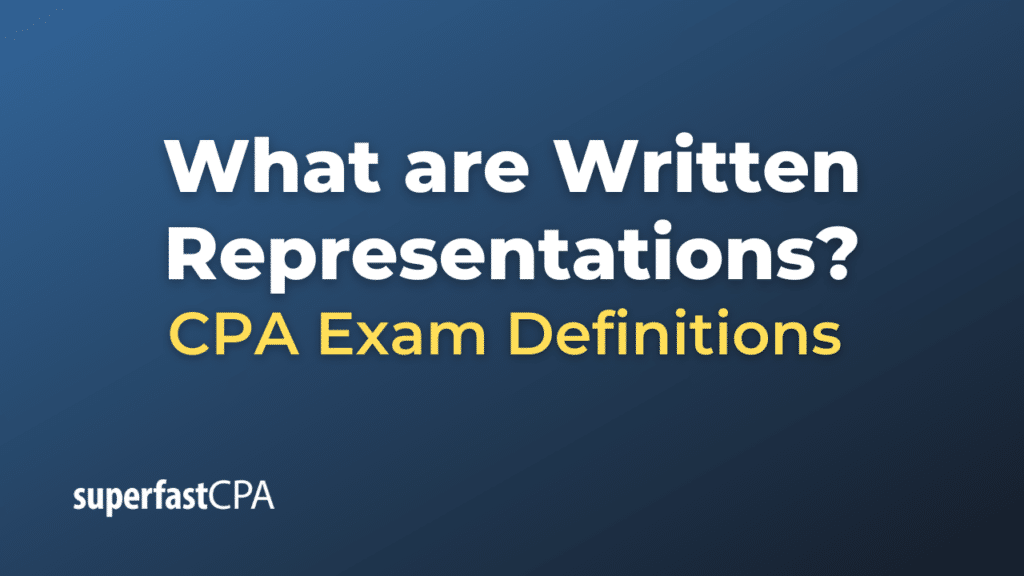Written Representations
In the context of accounting and auditing, “written representations” refer to statements provided by management to confirm certain matters or to support other audit evidence. Written representations are usually obtained by the external auditor in the form of a letter, commonly known as a “representation letter” or “management representation letter.”
The purpose of this letter is to confirm in writing the representations made by management during the audit process, reduce the risk of misunderstanding, and serve as a part of the audit evidence that supports the auditor’s opinion on the financial statements.
Common Items in a Written Representation
Written representations generally cover areas like:
- Fair Presentation: Management’s confirmation that the financial statements are presented fairly in all material respects and conform to generally accepted accounting principles (GAAP) or another applicable financial reporting framework.
- Completeness of Information: Assurance that all financial records, related data, and minutes of meetings have been made available to the auditor.
- Recognition and Measurement: Confirmations about the methods used for recognizing revenue, valuing inventory, depreciating assets, etc.
- Liabilities and Contingencies: Declarations concerning the completeness of recorded liabilities and the adequate disclosure of contingent liabilities.
- Subsequent Events: Information about events occurring after the balance sheet date but before the auditor’s report is issued, which might require adjustment or disclosure in the financial statements.
- Fraud and Non-Compliance: Statements confirming that management has disclosed all known instances of fraud or non-compliance with laws affecting the financial statements.
- Related Parties: Information regarding transactions with related parties and their appropriate disclosure in the financial statements.
Importance
Written representations are crucial for several reasons:
- Audit Evidence: They serve as a piece of audit evidence for the auditor.
- Clarity and Transparency: They help clarify management’s judgments and assumptions, making the audit process more transparent.
- Legal Protection: They may provide some level of legal protection for the auditor in case of disputes or litigation regarding the audit.
- Due Diligence: They enforce an additional level of scrutiny and responsibility on the part of management, as false statements could lead to legal repercussions.
It’s worth noting that while written representations are a valuable form of audit evidence, they are not a substitute for other audit procedures. Auditors are expected to obtain sufficient, appropriate audit evidence through other means as well to form an audit opinion.
Example of Written Representations
Let’s look at a simplified example to better understand the concept of written representations in the context of an audit.
Imagine you are an external auditor for XYZ Corp, a company that manufactures electronic components. You are nearing the end of your audit and have had numerous discussions with the company’s management throughout the process. To confirm these discussions and support your audit findings, you request a management representation letter.
Sample Management Representation Letter
Here’s a sample of what the letter might contain. Note that in a real-world setting, the language would be more formal and the list of items would be more extensive:
[XYZ Corp Letterhead]
[Date]
[Name of Audit Firm]
[Address]
To Whom It May Concern,
In connection with your audit of the financial statements of XYZ Corp for the year ended [Date], we, the undersigned, confirm the following representations:
1. We acknowledge our responsibility for the fair presentation of the financial statements in accordance with Generally Accepted Accounting Principles (GAAP).
2. All financial records, supporting documentation, and other relevant information have been made available to you.
3. There have been no irregularities involving management or employees who have significant roles in internal controls that could have a material effect on the financial statements.
4. All related-party transactions have been disclosed to you and are appropriately reflected in the financial statements.
5. We have disclosed all known liabilities, both actual and contingent, as of the balance sheet date.
6. Revenue recognition complies with applicable accounting standards and has been appropriately recorded.
7. We are not aware of any non-compliance with laws and regulations that could have a material effect on the financial statements.
8. There have been no events subsequent to the balance sheet date that require adjustment or disclosure in the financial statements.
We understand that your audit was made for the purpose of expressing an opinion on the financial statements taken as a whole and that you are relying on these representations to form your opinion.
Sincerely,
[Signature]
[Name, Title]
[Signature]
[Name, Title]Importance of the Letter
This representation letter serves as part of the audit evidence. It provides a written confirmation of what has been discussed and agreed upon with the management during the audit process. It also clarifies management’s responsibilities concerning the financial statements and internal controls.
The auditor will rely on this letter, in combination with other audit evidence gathered, to form an opinion on the financial statements. However, it’s worth reiterating that written representations are not a substitute for other audit procedures. If any of the statements in the representation letter are inconsistent with other audit evidence, the auditor would need to resolve such inconsistencies before issuing an audit report.













